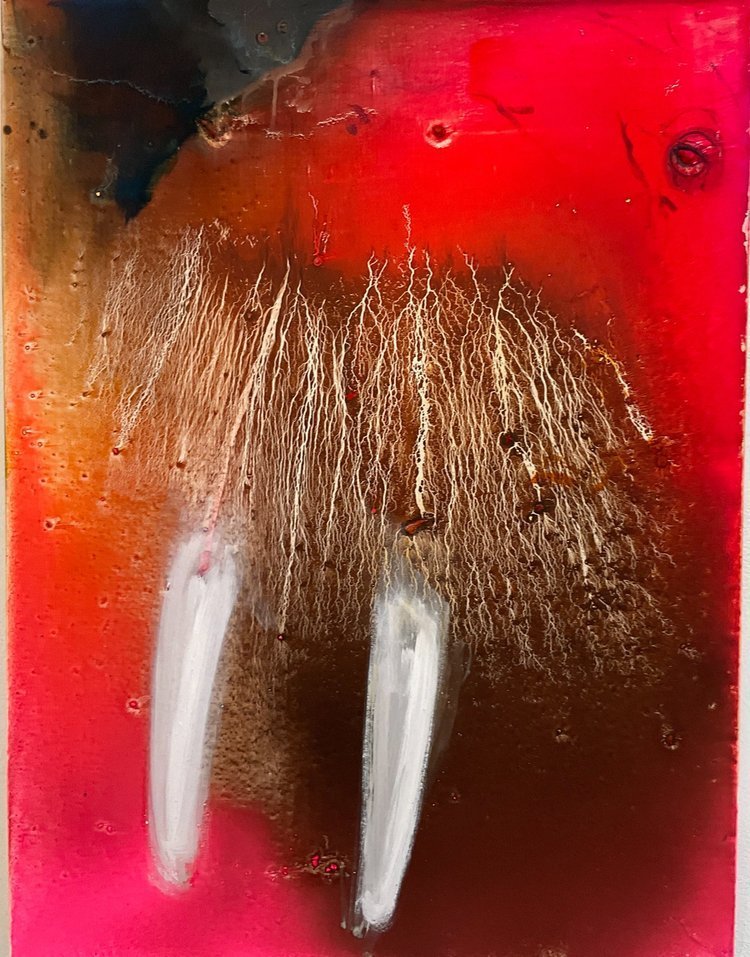Whitehot Magazine
Barbara Friedman
Barbara Friedman at FiveMyles
"Bat Control in the Mansion". 37" x 28", oil on linen, 2022
By JONATHAN GOODMAN September 14, 2023
Barbara Friedman lives downtown in New York City, where she also maintains her studio. She has had a long-term job teaching painting at Pace University, also located downtown. Her show of paintings at FiveMyles, a non-profit space devoted to a number of art activities in Crown Heights, Brooklyn, is exemplary of the artist’s passion for bright color; partial and complete versions of animals, real and imagined; and an overall conviction that surrealism backs her spirited vision of things. Single paintings are striking, as one-off compositions but they are more readily described as idiosyncratic than eccentric. This means a bit of plausibility enters the works, making them accessible rather than beyond the pale, which the term “eccentric” would suggest, The joining of neon colors, seemingly lit from within, with sharply detailed details of faces, some of them clearly actual and some of them expressed with broad expanses of color, in a color field style, result in an unusual, exciting body of work. The group of paintings, mostly the same size, display their electric colors on the gray walls found everywhere in the space.
"Grin Without" 44" x 37" , oil on linen, 2023
Friedman’s sharp colors are a major characteristic of her work. But, thematically, it is also worth discussing the role of humor in the work. Bat Control in the Mansion (2022) is a collection of disparate but recognizable animal imagery: the small head of a bat facing downward from the upper left toward the center of the paper. And the center is taken up by the bulbous face and body of a walrus whose skin is a bright red. Beneath the two black pinholes that stand for eyes, is a thick mustache–a mustache so thick it matches the mustache of Stalin. The allusion may well seem far-fetched, but the point is that Friedman is not operating within any constraint that would limit her imagination. Anything could be possible, and is. Grin Without (2023) shows the smile, painted photorealistically, of a porpoise with a broad, smooth gray skin; the area around the eye on the right is yellow. Once again Friedman’s excellent technical skill takes over, but the realism of the painting is humorously undercut by the smile and its very porpoise-like but also nearly human-seeming demeanor. Each of Friedman’s paintings are strange in proportion to their odd coloring, being more true to art than to nature. But their odd compilation of detail, which doesn’t match what we expect of a realistically rendered creature, makes the work memorably biased in favour of Freedman’s expansive imagination.
"Blue Spittle" 37" x 28", oil on linen, 2021-22.
In Blue Spittle (2021-22), Friedman takes a very primal image of a sea creature's mouth, with the teeth in perfect, frighteningly sharp array and the tongue hanging out in an aggressive, somewhat erotic fashion. Red, the color of passion, but also the color of blood and its implied violence, dominates the composition, ranging from a bloody mist to a thicker reddish hue. The open mouth is set in the center of the composition. At once an image from a horror movie and, perhaps, a study of a particularly unattractive sea creature, the cavernous mouth, inhabited (as described) by sharp teeth and a ghastly tongue, presents danger without compromise. We cannot tell if the animal is real or imagined, but maybe that’s the point– Friedman operates very well within the cusp of the imaginary and the true.
Mount Rushmore (2022-23), a work painted in an acid green, shows a badger-like animal slinking across the top of the composition. Beneath it is a close study of a prominent nose with a mustache. The viewer is hard put to join the work’s title to the imagery, but little matter– Friedman seems determined to make monuments from objects, usually small things to see. The artist, whose drawing skills are very strong, juxtaposes far-flung objects in the hope that the relationships will comment on ties we wouldn’t necessarily see: a major feature of the surrealist outlook. In many ways her work is an Americanization of the surrealist tradition, here done extremely well in the hands of someone devoted to craft, and who wants to advance the juxtapositions occurring among things not necessarily intended for close comparison. WM


